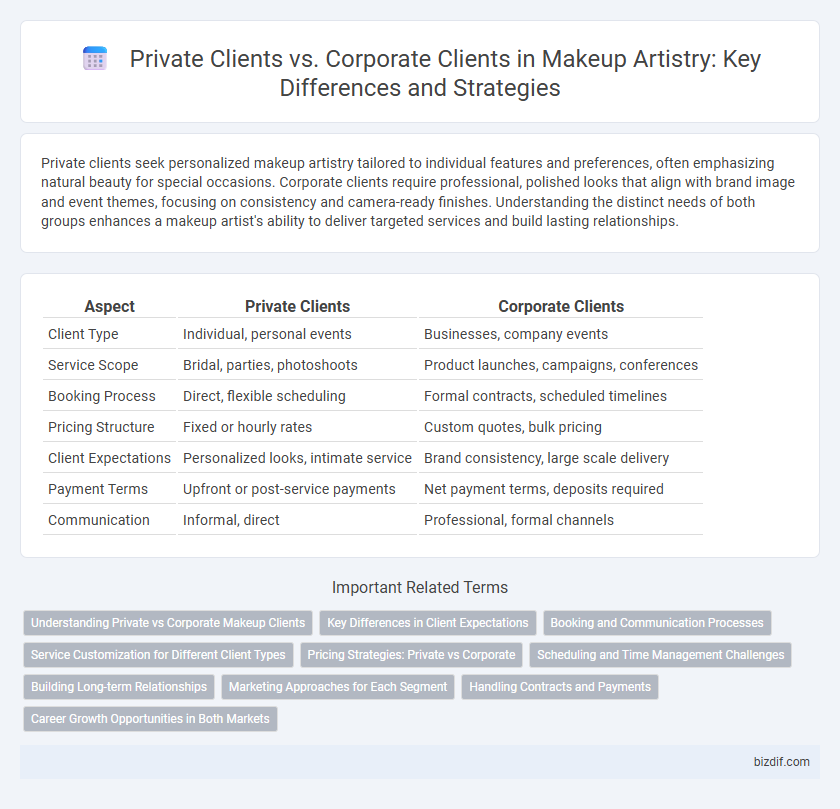Private clients seek personalized makeup artistry tailored to individual features and preferences, often emphasizing natural beauty for special occasions. Corporate clients require professional, polished looks that align with brand image and event themes, focusing on consistency and camera-ready finishes. Understanding the distinct needs of both groups enhances a makeup artist's ability to deliver targeted services and build lasting relationships.
Table of Comparison
| Aspect | Private Clients | Corporate Clients |
|---|---|---|
| Client Type | Individual, personal events | Businesses, company events |
| Service Scope | Bridal, parties, photoshoots | Product launches, campaigns, conferences |
| Booking Process | Direct, flexible scheduling | Formal contracts, scheduled timelines |
| Pricing Structure | Fixed or hourly rates | Custom quotes, bulk pricing |
| Client Expectations | Personalized looks, intimate service | Brand consistency, large scale delivery |
| Payment Terms | Upfront or post-service payments | Net payment terms, deposits required |
| Communication | Informal, direct | Professional, formal channels |
Understanding Private vs Corporate Makeup Clients
Private makeup clients typically seek personalized, one-on-one services for special occasions such as weddings, photoshoots, or personal events, valuing customized looks and intimate consultations. Corporate makeup clients often require professional, consistent, and brand-aligned aesthetics for events, marketing campaigns, or media appearances, emphasizing efficiency and collaboration with creative teams. Understanding the distinct expectations and service delivery styles for private versus corporate clients enables makeup artists to tailor their approach for maximum client satisfaction and professional success.
Key Differences in Client Expectations
Private clients prioritize personalized makeup services tailored to individual features and occasions, seeking a natural or glam look that complements their unique style. Corporate clients expect consistent, professional results suitable for branding purposes, often requiring makeup that maintains a polished appearance under various lighting and long hours. The key difference lies in the customization level and the functional focus of the makeup, with private clients valuing personal expression and corporate clients emphasizing brand alignment and durability.
Booking and Communication Processes
Booking private clients usually involves personalized consultation and flexible scheduling through direct communication channels like phone or messaging apps. Corporate clients require formalized booking procedures, often including contracts, detailed proposals, and coordinated meetings to align with event planners. Communication with corporate clients emphasizes professionalism and clear timelines, while private clients expect more casual and immediate interaction for quick modifications.
Service Customization for Different Client Types
Makeup artistry for private clients involves highly personalized service customization, focusing on individual preferences, skin tones, and event-specific looks such as weddings or photoshoots. Corporate clients require tailored packages that emphasize brand consistency, uniformity in appearance for promotional events, and scalability to accommodate large teams. Understanding the distinct needs of private versus corporate clients ensures makeup artists deliver targeted solutions that enhance client satisfaction and professional outcomes.
Pricing Strategies: Private vs Corporate
Pricing strategies for makeup artistry differ significantly between private and corporate clients, with private clients often paying premium rates for personalized, one-on-one services and bespoke looks tailored to special occasions such as weddings and photoshoots. Corporate clients usually benefit from negotiated package deals or bulk discounts, reflecting ongoing partnerships for events, branding campaigns, or employee grooming seminars. Structuring pricing with clear distinctions in service scope, frequency, and customization ensures alignment with client expectations and maximizes revenue streams.
Scheduling and Time Management Challenges
Managing schedules for private clients often involves flexible timing and personalized appointments, which can lead to unpredictable work hours and last-minute changes. Corporate clients typically require strict adherence to fixed schedules for events, demanding precise time management and the ability to coordinate with larger teams. Efficiently balancing these contrasting demands is essential for makeup artists aiming to optimize their workflow and maintain client satisfaction.
Building Long-term Relationships
Building long-term relationships with private clients in makeup artistry involves personalized service, detailed consultations, and consistent quality to foster trust and repeat business. Corporate clients require scalable solutions, professional reliability, and brand alignment to establish ongoing partnerships for events, campaigns, and promotional activities. Understanding the unique needs of each client type enhances client retention and professional reputation in the competitive makeup industry.
Marketing Approaches for Each Segment
Private clients in makeup artistry respond best to personalized marketing strategies emphasizing individual style consultations, social media engagement showcasing transformation stories, and referral incentives to build trust and loyalty. Corporate clients require targeted outreach through professional networking, showcasing portfolio versatility via corporate event collaborations, and presenting tailored packages that align with brand image and event objectives. Differentiated marketing approaches leverage client-specific needs, enhancing conversion rates and client retention in both private and corporate segments.
Handling Contracts and Payments
Handling contracts and payments for private makeup clients typically involves personalized agreements specifying services, dates, and cancellation policies to ensure clarity and trust. Corporate clients require detailed contracts outlining scope, timelines, deliverables, and invoicing procedures to meet organizational standards and facilitate bulk transactions. Efficient management of deposits, payment schedules, and tax documentation is crucial for maintaining professional relationships in both private and corporate makeup artistry engagements.
Career Growth Opportunities in Both Markets
Private clients offer makeup artists personalized, high-end projects that enhance portfolio diversity and encourage creative experimentation, leading to strong word-of-mouth and social media referrals. Corporate clients provide consistent work through brand partnerships, advertising campaigns, and event makeup services, fostering professional network expansion and stable income growth. Mastery in both markets cultivates versatility and resilience, essential for long-term career advancement in the makeup artistry industry.
Private clients vs Corporate clients Infographic

 bizdif.com
bizdif.com